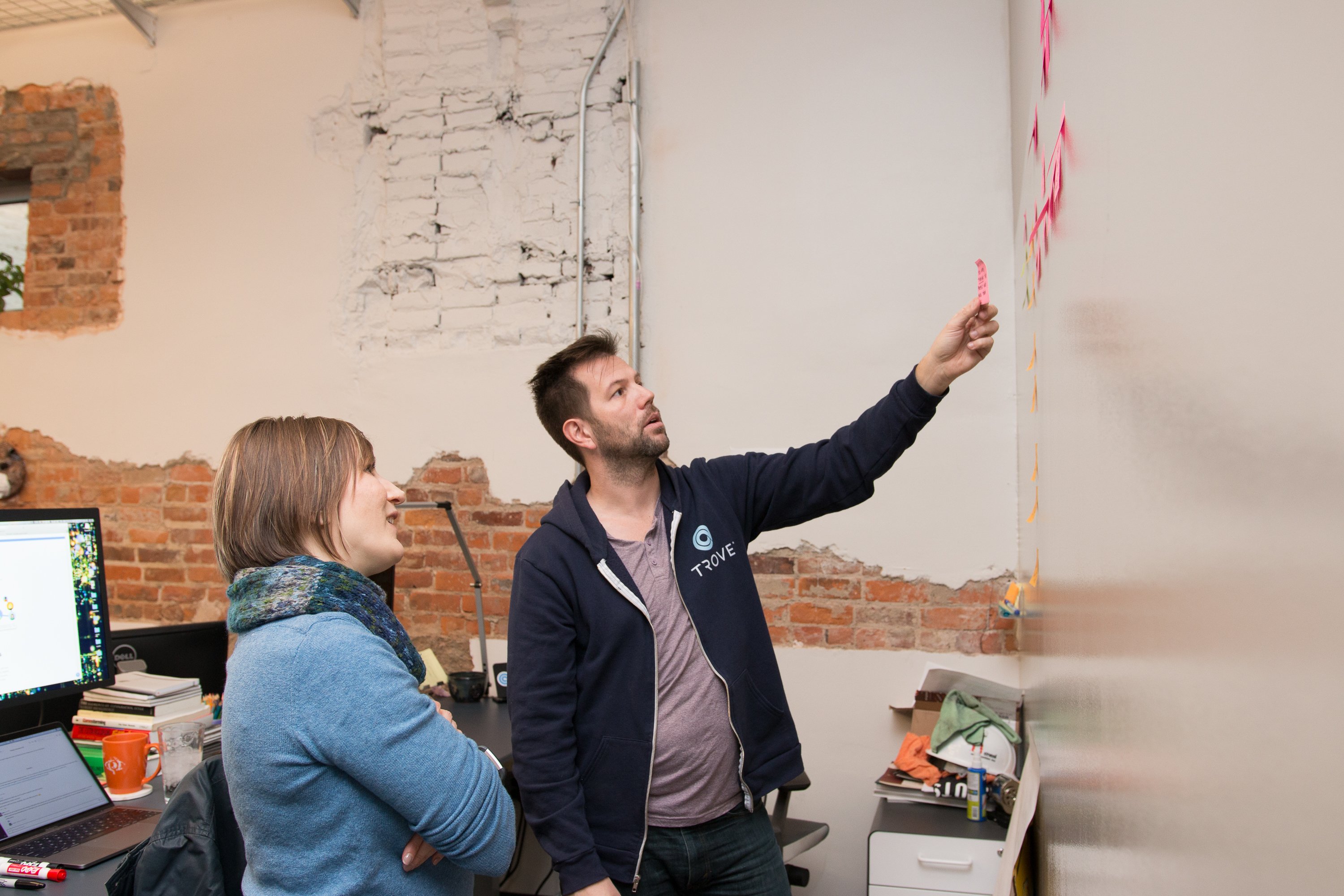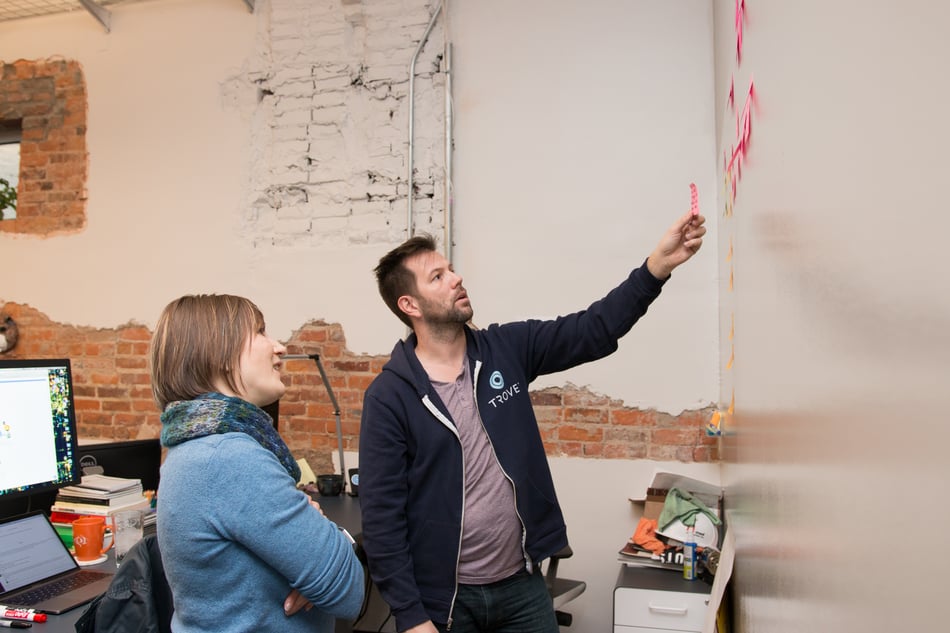This blog is adapted from a two-part examination of leadership, published on Second Mountain Startup.
As entrepreneurs, we’re inherently vulnerable to potentially bad outcomes, something which our brains are wired to avoid. So it’s no wonder we try to present an image of success and certainty—of “crushing it”—even when the reality is anything but.
I used to do this better than most. I would project success at all times, carefully curating an image of the leader who was certain where he was going, and that he would get there.

To some degree people respond to that: “Success & Certainty” leadership, as I call it. Everyone is uncomfortable with uncertainty, so people flock to a leader who seems to know the answer. However, despite our discomfort with vulnerability and uncertainty, there are a few major costs of Success & Certainty leadership, which collectively outweigh the benefits.
Why Success & Certainty Leadership Leads to Failure
1. You Can’t See The Whole Elephant
There’s an old Buddhist parable about a group of blind men who stumble upon an elephant for the first time. In trying to collectively determine the nature of the creature, they each touch different parts of the animal and describe their experience to one another. But since they’re only feeling a part of the elephant, none of them gets the full picture.

Business is like this. Whether you’re C-suite or entry-level, you only have the ability to see part of the elephant. Successful & Certain leaders often experience other opinions and ideas as challenges to their competence. Then, they end up focusing more on defending their position than learning from other perspectives or making good decisions. Plus, Success & Certainty leaders tend to learn slowly on their own (often by painful experience), rather than learning quickly from the wisdom of their team.
Better decisions come from a better understanding of the problem. This happens much more rapidly when you realize you can’t see the whole elephant, and stop acting like you can.
2. Success & Certainty Exacerbates Imposter Syndrome
For a long time running a startup, I had cherry-picked responses to the question, “how’s it going?” No matter what, the impression the other person was left with was that we were “crushing it.”
Meanwhile, like all startups we faced tons of problems. Competition, software crashes, missed revenue milestones. The works. Maintaining a public persona of success while frantically trying to solve life-threatening problems behind the scenes can feel a lot like living a double life—like you have to strap on a mask to go to work.
Anyone stretching themselves to create something brand new is going to battle some amount of imposter syndrome. This is bad enough when it’s all in your head, but deliberately cultivating an image of success and masking real problems can make it much worse.
Building a business is inherently uncertain, and everyone involved knows it. Present your business’s best side, but be up front about its weak spots and holes as well. Investors (and employees) will respect you for your transparency, and you’ll have enlisted an ally in solving the actual problems your business faces.
3. Projecting Success & Certainty Stifles Innovation
Ever get the feeling everyone around you is doing really well, you’re just… not? You start to wonder if whatever you’re doing is actually easy and you’re just uncommonly bad at it.
This is what it feels like to innovate within a company where all the metrics are up and to the right.
Innovation requires taking a risk. Creating something new requires putting some part of yourself on the line, emotionally taking the chance that the thing you create might suck and everyone might laugh at you. Leaders who seem like they’re successful all the time (whether or not it’s true) make their employees less likely to take the risks necessary to innovate, because employees don’t want to be the only one who fails.
The Alternative
So, if we’ve thoroughly debunked the efficacy of leading from a place of Success and Certainty, what’s the alternative? Failure and uncertainty leadership?
Definitely not. Clarity of vision is critical in leadership, despite the uncertainty of achieving it. Otherwise you’d never know where you’re leading.
The key to strong leadership, I’ve found, is in being at once both Vulnerable and Committed. Vulnerable, as in fully human, warts and all, with nothing hidden. Committed, as in acknowledging the difficulty of what you’re doing in building a company, and marching forward anyway.

Image: Dynamo Metrics
The Power of a Vulnerable & Committed Leader
One of the hard realities of starting a business is that, unless you’ve done it many times before, you likely don’t know how to do your job well. This doesn’t mean you’re not talented; it’s just the nature of entrepreneurship. And in reality, nobody really knows what the hell they’re doing. The successful ones are those who, faced with their own inadequacy, move forward anyway.
You grow into yourself as a leader when you stop pretending to have all the answers, or to be constantly successful, and instead to be willing to be yourself and step into the immense uncertainty of running a company, undeterred.
From David Whyte:
We have (a) strange idea in work… that we will engender love, loyalty, and admiration in others by exhibiting a great sense of power and competency. We are surprised to find that we garner fear and respect but forgo the other, more intimate magic. Real, undying loyalty in work can never be legislated or coerced; it is based on a courageous vulnerability that invites others by our example to a frontier conversation whose outcome is yet in doubt.
Every person has their struggles, and when a leader steps up and cops to his, people listen. When a leader doesn’t sugarcoat the situation but instead deals with it head on, people listen. (If you need an example, here’s one of my favorites.)
This combination of personal vulnerability and the willingness to deal with the reality of a situation, however messy it is, can bond a leader to their team. And when the leader moves forward, despite knowing their own shortcomings and fears, they invite the team to move forward, too.
This is the power of Vulnerable & Committed leadership.
So Why Does Vulnerable & Committed Leadership Work?
1. You Invite Your Team To Truly Dedicate Their Whole Selves
As a leader, “crushing it” sends the message that your team must do that, too. And since nobody actually crushes it all the time, what really happens is everyone just pretends they do.
Many leaders ask for teams to dedicate themselves, but someone pretending to be something they’re not can’t truly dedicate themselves. To truly engage with the hearts of your team, you must give them the space to be fully themselves at work.
You do this by being fully yourself.
By being honest about your failures, your imperfections and the things you don’t know, you give others permission to be their imperfect selves as well. Your commitment in the face of those imperfections and uncertainty invites your team to courageously make the same commitment in the face of their own fears.
2. You Let Your Team Make You Smarter
Nobody can see the entirety of the elephant. Leaders who communicate their opinions in the form of facts (a la “strong opinions loosely held” or similar) simply make it difficult for their team to help them see the bigger picture.

Image: Cahoots
By taking pains to accurately represent your level of certainty in stating your opinion without selling it (see this excellent article for an easy way to do this), and by publicly embracing the fact that you do not—and cannot—see the whole picture, you open the door for others to contribute to your understanding. And a more complete, nuanced understanding of the problem enables you and your company to make better decisions. As Jack Welch said, “The team that sees reality the best, wins.”
3. You Get To Be Yourself, And That Becomes Enough
Finally, and most importantly, by aligning your public persona with the real, fallible, vulnerable human underneath, you bring your thoughts/words/actions into harmony, which no less than Gandhi has said is the key to happiness (and I can attest).
Building a company is tremendously hard. Everybody struggles, despite what you see on TechCrunch. The best entrepreneurs in the world have bad days, weeks, and months. The best entrepreneurs in the world fail sometimes. Everybody does. This journey that we’ve chosen can eat you alive and make you feel inferior, like an imposter. It will surely make you feel like you’re all alone in the world, carrying a boulder up a mountain. It’s easy to internalize these feelings, and doing so can make the journey hellish.
But compassion is the cure. Compassion for the inevitability that you will struggle, and you will fail, and that it’s normal and ok. It doesn’t make you a bad CEO; it makes you human. Acknowledging that fact enables you to gracefully do what all great leaders do: press forward.
It takes tremendous courage to push through all that and lead our companies as the uncertain, vulnerable, committed beings we are, but while certainty isn’t a requirement for success, bravery most certainly is.
About Ryan Vaughn:
 As a leadership coach to entrepreneurs, Ryan works with amazing humans every day to build the company of their dreams and grow into extraordinary leaders. He can do this uniquely well because he's been there.
As a leadership coach to entrepreneurs, Ryan works with amazing humans every day to build the company of their dreams and grow into extraordinary leaders. He can do this uniquely well because he's been there.
Ryan knows about all the highs of entrepreneurship. A 3x founder/CEO, Ryan has scaled companies to over 11-million users across 45 states, raised over $20m from leading VCs, built a team of nearly 100 world-class employees, and acquired or partnered with nearly a dozen companies.
And he knows about the lows—losing your biggest customer, the fear of missing payroll. He knows about loneliness, and those times when you wonder how you’ll survive.
Ryan has been there, and he's here to help. If you're interested in accelerating your growth as a leader, visit ryanhvaughn.com. And if you liked this article, please subscribe to Second Mountain Startup, Ryan's popular weekly newsletter about the art of startup leadership.
Looking to build your team? Get matched with curated talent.








.png?width=50&name=Erin%20Gregory%20(1).png)